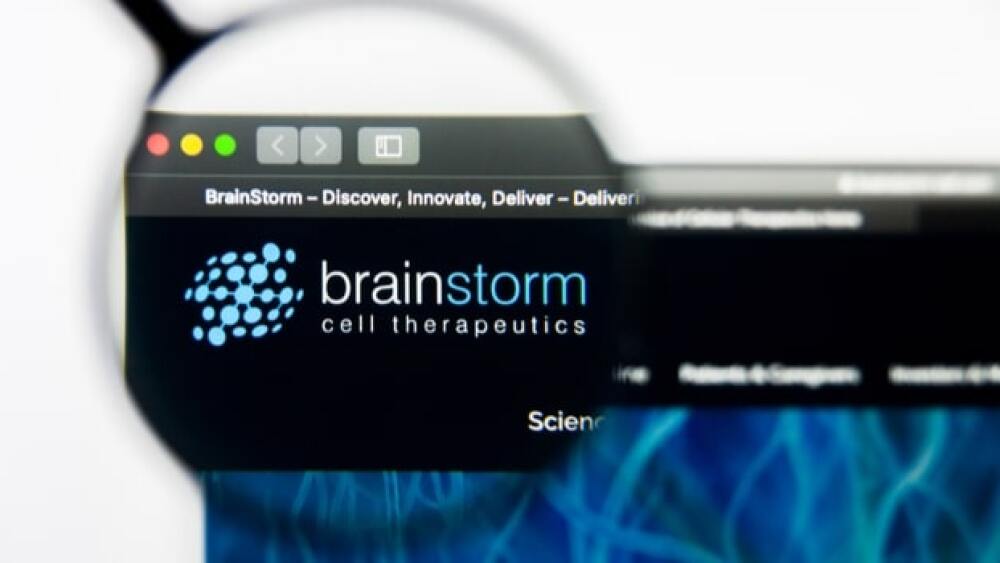BrainStorm Cell Therapeutics is making a strong comeback after the FDA was a little impressed with Phase III results of amyotrophic lateral sclerosis treatment.
Brainstorm didn’t stop after a no from FDA for amyotrophic lateral sclerosis treatment and plans to make a big comeback.
A diagnosis of amyotrophic lateral sclerosis (ALS) is like receiving a delayed death sentence. Progressive and fatal, around 30,000 people in the U.S. have the neurological disease, with 5,000 new cases diagnosed each year. The average life span after diagnosis is two to five years.
While the U.S. Food and Drug Administration has approved only three treatments for ALS, one to prolong life span by a paltry 3
–6 months, another to reduce daily function decline, and one to treat an amyotrophic lateral sclerosis side effect, the scientific community has not given up. Last week, the House of Representatives unanimously approved a bill to bring massive research funding for the disease. And today’s news holds more promise for patients with devastating diagnosis.
About Brainstorms’s Amyotrophic Lateral Sclerosis Treatment
New York-based BrainStorm Cell Therapeutics faced a blow earlier this year when the FDA was less than impressed with the Phase III results of the company’s experimental ALS treatment. A readout of topline results showed only meager improvements to the widely used scale for measuring function in amyotrophic lateral sclerosis patients.
But BrainStorm wasn’t satisfied with the initial reading. The trial included more severe, further-progressed cases than an ALS study normally would. And there’s more than one way to test efficacy. The team believed there still was a pathway for approval.
“The worst thing we could do is dismiss a drug that actually could be helping people, even if it’s a subset of people or a certain part of the illness,” ALS specialist Merit Cudkowicz, M.D., told BioSpace. Cudkowicz is the chief of neurology and director of the Sean M. Healey & AMG Center for ALS at Massachusetts General Hospital.
The team dug deeper into the results, utilizing biomarkers of patients to test the actual efficacy of the drug. They found that BrainStorm’s NurOwn targeted multiple disease pathways of amyotrophic lateral sclerosis.
This biomarker analysis proved that NurOwn significantly lowered neuroinflammation, decreased neurodegeneration, and significantly increased neuroprotection compared to the placebo.
Cudkowicz was happy to share that the drug showed no safety issues while being biologically active. The biomarker changes were “very impressive.”
“That’s something that’s new in ALS,” she said. “To be able to show that your drug did what it was supposed to do and then might be able to pick up in what people it might work better.”
BrainStorm published a peer-reviewed paper on the clinical data in Muscle and Nerve, providing complete transparency of the trial results.
“This paper gives a really important view not only how biomarkers give us confidence in the response that we see in the paper, but also how participants who entered the trial with very progressed amyotrophic lateral sclerosis influenced the topline that was read out,” Stacy R. Lindborg, Ph.D., EVP and Chief Development Officer at Brainstorm told BioSpace.
While the team isn’t sharing any timelines at the moment for pushing NurOwn’s approval, Lindborg assures they’ve been having discussions with the FDA since the early readout. It is something they’re “fully committed to” and a top priority for the company.
When asked if this would be enough to get the drug approved and into the hands of ALS patients, Cudkowicz said, “I can’t claim to know what the FDA will do, but I think it’s enough to have that discussion. There are pathways for cancer where we have provisional or accelerated approval based on biomarkers. ALS is just as bad as cancer.”
Prepping for hopeful approval, BrainStorm has transferred all its technology to Catalent to manufacture NurOwn. According to the release, NurOwn will be manufactured at Catalent’s world-class 32,000 square-foot cell therapy manufacturing facility in Houston, Texas.
On the other side of the country, MediciNova snagged a Notice of Allowance from the U.S. Patent and Trademark Office for a patent application covering its experimental amyotrophic lateral sclerosis treatment, MN-166, used in combination with decades-old riluzole, branded Rilutek. A Phase II trial showed the duo could significantly improve functional activity and quality of life compared to Rilutek alone.
When issued, the patent is expected to cover the combination treatment method until November 2035. It will be the third patent approved in the U.S. for MN-166.
An international research collaboration has uncovered 15 disease-associated gene variants in sporadic amyotrophic lateral sclerosis patients, the type of ALS that accounts for 95% of cases. The study was led by Professor Jan Veldink from the University of Utrecht, in the Netherlands, with a handful of Italy-based research groups.
Eight of the seven genes had already been identified in previous studies. The addition of seven more genes will help better delineate the disease-specific mechanisms of neurodegeneration. Interestingly, the group found that high cholesterol levels seem to play a causal role in ALS. One more reason to get those LDL numbers under control.






